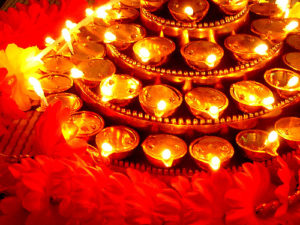Why do we celebrate Diwali? It’s not just the festive mood in the air that makes you happy, or just that it’s a good time to enjoy before the advent of winter. There are 10 mythical and historical reasons why Diwali is a great time to celebrate. And there are good reasons not just for Hindus but also for all others to celebrate this great Festival of Lights.

1. Goddess Lakshmi’s Birthday: The Goddess of wealth and the consort of the god Vishnu is Lakshmi, one of the principal deities of the Hindu religion and the Supreme Being in the Vaishnavism Tradition. According to mythology, she was first incarnated on the new moon day (amaavasyaa) of the Kartik month during the churning of the ocean (samudra-manthan). She is one of the most popular of goddesses, and thus strongly associated with Diwali.
2. Vishnu Rescued Lakshmi: On this very day (Diwali day), Lord Vishnu disguised in his fifth incarnation as Vaman-avtaara (the dwarf avatar and Vishnu’s first incarnation) rescued Lakshmi from the prison of King Bali. and this is another reason of worshipping Ma Larkshmi on Diwali.
3. Krishna Killed Narakaasur: On the day preceding Diwali, Lord Krishna killed the demon king Narakaasur of Pragjothispura, who had invaded the three worlds, taking great pleasure in torturing the beings there. Krishna rescued 16,000 women from his captivity. The celebration of this freedom went on for two days including the Diwali day as a victory festival: The second day of Diwali is Naraka Chaturdasi.
4. The Return of the Pandavas: According to the great epic ‘Mahabharata,’ it was ‘Kartik Amavashya’ when the five Pandavas (brothers Yudhishthira, Bhima, Arjuna, Nakula, and Sahadeva) appeared from their 12 years of banishment as a result of their defeat in the hands of the Kauravas at the game of dice (gambling). The subjects who loved the Pandavas celebrated the day by lighting the earthen lamps.
5. The Victory of Rama: According to the epic ‘Ramayana,’ it was the new moon day of Kartik when Lord Ram, Ma Sita, and Lakshman returned to Ayodhya after vanquishing the demon king Ravana and conquering Lanka. The citizens of Ayodhya decorated the entire city with the earthen lamps and illuminated it like never before, and the festival of Diwali is in honor of Rama’s victory.
6. Coronation of Vikramaditya: One of the greatest of Hindu kings, Vikramaditya was crowned on the Diwali day. The legendary emperor, who may have been a historical figure or based on one, is thought of as the ideal king, known for his generosity, courage, and patronage of scholars. Thus, Diwali became a historical event as well.
7. Special Day for the Arya Samaj: It was the new moon day of Kartik (Diwali day) when the 19th-century scholar Maharshi Dayananda, one of the greatest reformers of Hinduism and the founder of Arya Samaj, attained his nirvana. Dayananda’s great mission was to ask humankind to treat one another as brothers through practices of nobility.
8. Special Day for the Jains: Mahavir Tirthankar, considered to be the founder of modern Jainism also attained his nirvana on Diwali day. Mahavira abandoned his royal life and left his family to become an ascetic, undertaking fasting and bodily mortifications. At the age of 43, he achieved the state of Kevala Jnanan and began teaching the philosophy of Jainism.
9. Special Day for the Sikhs: The third Sikh Guru Amar Das institutionalized Diwali as a Red-Letter Day when all Sikhs would gather to receive the Gurus blessings. In 1577, the foundation stone of the Golden Temple at Amritsar was laid on Diwali. In 1619, the sixth Sikh Guru Hargobind, who was held by the Mughal Emperor Jahangir, was released from the Gwalior fort along with 52 kings.
10. The Pope’s Diwali Speech: In 1999, Pope John Paul II performed a special Eucharist in an Indian church where the altar was decorated with Diwali lamps, the Pope had a ‘tilak’ marked on his forehead and his speech bristled with references to the festival of light.
